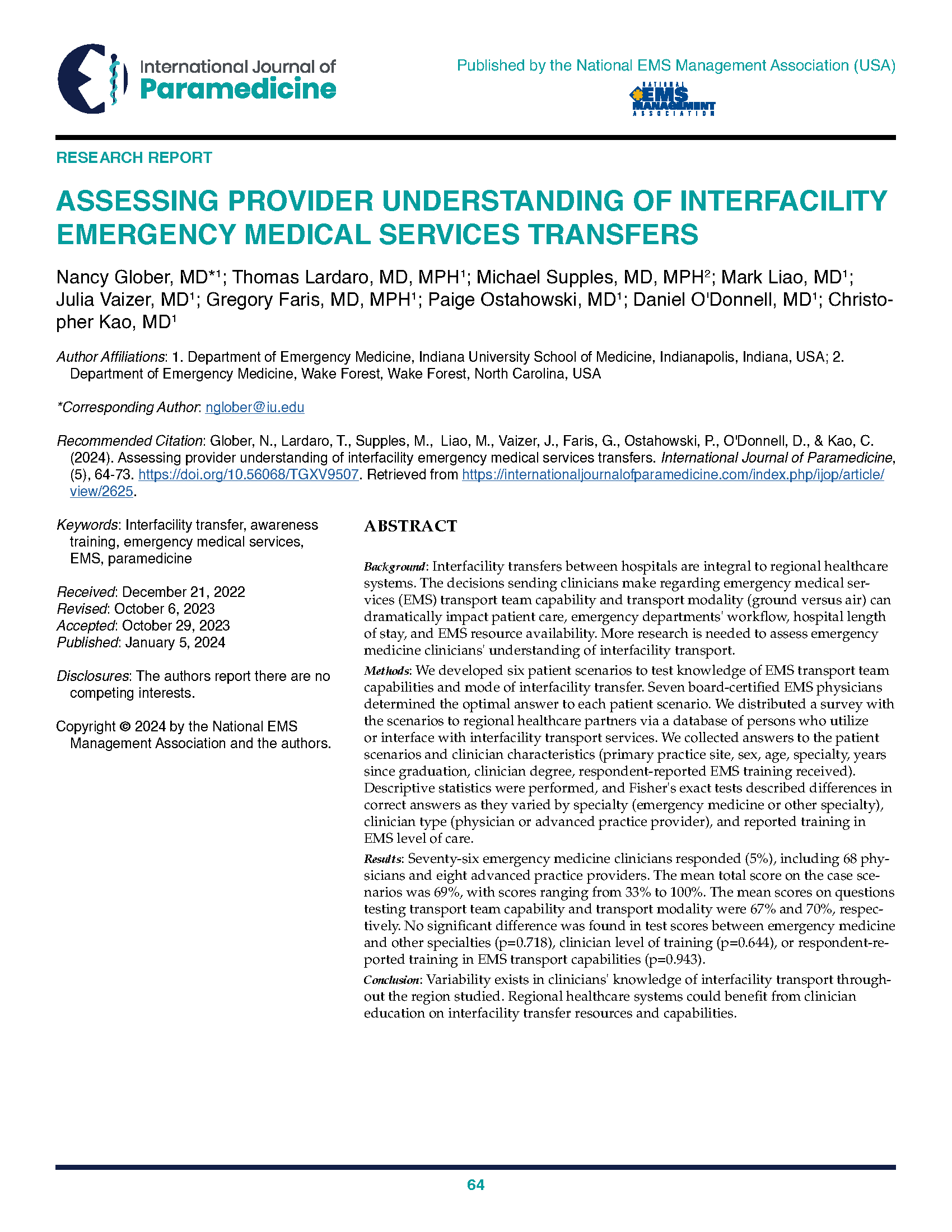Assessing Provider Understanding of Interfacility Emergency Medical Services Transport
Main Article Content
Abstract
Background: Interfacility transfer between hospitals is an integral component of regional healthcare systems. The decisions referring providers make regarding emergency medical services (EMS) level of care and transport modality (ground versus air) can dramatically impact patient care, emergency departments' workflow, hospital length of stay, and EMS resource availability. Limited research has been done to assess understanding of interfacility transport by emergency medicine providers.
Methods: We developed six patient scenarios to test knowledge of level of care and mode of interfacility transfer. Seven board-certified EMS physicians determined the optimal answer to each patient scenario. We distributed a survey with the scenarios to regional healthcare partners via a database of persons who utilize or interface with interfacility transport services. We collected answers to the patient scenarios and provider characteristics (primary practice site, sex, age, specialty, years since graducation, provider degree, EMS training received). Descriptive statistics were performed and Fisher's exact tests described differences in correct answers as they varied by specialty (emergency medicine or other specialty), provider type (physician or advanced practice provider), and reported training in EMS level of care.
Results: Seventy-six emergency medicine providers responded, including 68 physicians and 8 advanced practice providers. The mean total score on the case scenarios was 66%, with scores ranging from 33% to 100%. The mean scores on questions testing level of care and transport modality were 67% and 70%, respectively. No significant difference was found in test scores between emergency medicine and other specialties (p=0.718) or provider level of training (p=0.799). Training in EMS level of care was correlated with higher scores on the transport modality questions (p=0.003) but not on the level of care questions (p=0.231).
Conclusion: Variability exists in the knowledge of providers on interfacility transport throughout the state. Emergency medicine providers could benefit from education on interfacility transfer resources.
Article Details

This work is licensed under a Creative Commons Attribution-ShareAlike 4.0 International License.
Publishing in IJOP allows authors to keep their copyright while giving IJOP unrestricted copyright permissions. Articles published in IJOP use Creative Common Attribution 4.0 International (CC BY-ND 4.0) licensing. This license requires that re-users give credit to the creator. It allows re-users to copy and distribute the material in any medium or format in unadapted form only, even for commercial purposes. Additional terms apply and can be accessed here.
Publishing in IJOP also allows authors to have contracts for non-exclusive distribution of the Journal's published version of the article, such as posting to an institutional repository or publication in a book, on the condition that the original publication in the original layout format in IJOP is retained and acknowledged.
We permit and encourage authors to post the articles they published in IJOP on their affiliated websites. This helps share the information, encourages citation in other works, and promotes scholarly discourse in the spirit of open access.
References
National Highway Traffic Safety Administration. Guide for Interfacility Patient Transfer 2006. Available from: https://www.ems.gov/pdf/advancing-ems-systems/Provider-Resources/Interfacility_Transfers.pdf.
Allen J, Hutchinson AM, Brown R, Livingston PM. Quality care outcomes following transitional care interventions for older people from hospital to home: a systematic review. BMC Health Serv Res. 2014;14:346. Epub 20140815. https://doi.org/10.1186/1472-6963-14-346. PubMed PMID: 25128468; PubMed Central PMCID: PMC4147161. https://pubmed.ncbi.nlm.nih.gov/25128468/
Britton MC, Ouellet GM, Minges KE, Gawel M, Hodshon B, Chaudhry SI. Care Transitions Between Hospitals and Skilled Nursing Facilities: Perspectives of Sending and Receiving Providers. Jt Comm J Qual Patient Saf. 2017;43(11):565-72. Epub 20171004. https://doi.org/ 10.1016/j.jcjq.2017.06.004. PubMed PMID: 29056176; PubMed Central PMCID: PMC5693352. https://europepmc.org/article/med/29056176
Coleman EA. Falling through the cracks: challenges and opportunities for improving transitional care for persons with continuous complex care needs. J Am Geriatr Soc. 2003;51(4):549-55. https://doi.org/10.1046/j.1532-5415.2003.51185.x. PubMed PMID: 12657078. https://pubmed.ncbi.nlm.nih.gov/12657078/
Coleman EA, Boult C, Committee AGSHCS. Improving the quality of transitional care for persons with complex care needs. J Am Geriatr Soc. 2003;51(4):556-7. https://doi.org/10.1046/j.1532-5415.2003.51186.x. PubMed PMID: 12657079. https://pubmed.ncbi.nlm.nih.gov/12657079/
Enderlin CA, McLeskey N, Rooker JL, Steinhauser C, D'Avolio D, Gusewelle R, et al. Review of current conceptual models and frameworks to guide transitions of care in older adults. Geriatr Nurs. 2013;34(1):47-52. Epub 20121101. https://doi.org/10.1016/j.gerinurse.2012.08.003. PubMed PMID: 23122908. https://pubmed.ncbi.nlm.nih.gov/23122908/
Hirschman KB, Hodgson NA. Evidence-Based Interventions for Transitions in Care for Individuals Living With Dementia. Gerontologist. 2018;58(suppl_1):S129-S40. https://doi.org/10.1093/geront/gnx152. PubMed PMID: 29361067. https://pubmed.ncbi.nlm.nih.gov/29361067/
Marengoni A, Angleman S, Melis R, Mangialasche F, Karp A, Garmen A, et al. Aging with multimorbidity: a systematic review of the literature. Ageing Res Rev. 2011;10(4):430-9. Epub 20110323. https://doi.org/10.1016/j.arr.2011.03.003. PubMed PMID: 21402176. https://pubmed.ncbi.nlm.nih.gov/21402176/
Naylor MD, Aiken LH, Kurtzman ET, Olds DM, Hirschman KB. The care span: The importance of transitional care in achieving health reform. Health Aff (Millwood). 2011;30(4):746-54. https://doi.org/10.1377/hlthaff.2011.0041. PubMed PMID: 21471497. https://pubmed.ncbi.nlm.nih.gov/21471497/
Dwyer R, Gabbe B, Stoelwinder JU, Lowthian J. A systematic review of outcomes following emergency transfer to hospital for residents of aged care facilities. Age Ageing. 2014;43(6):759-66. Epub 20141014. https://doi.org/10.1093/ageing/afu117. PubMed PMID: 25315230. https://pubmed.ncbi.nlm.nih.gov/25315230/
Dalkey N, Helmer O. An Experimental Application of the Delphi Method to the use of experts. 3 ed. Management Science1963. p. 458-67. https://www.rand.org/content/dam/rand/pubs/research_memoranda/2009/RM727.1.pdf
Goodman CM. The Delphi technique: a critique. J Adv Nurs. 1987;12(6):729-34. https://doi.org/10.1111/j.1365-2648.1987.tb01376.x. PubMed PMID: 3320139. https://pubmed.ncbi.nlm.nih.gov/3320139/
ACGME. ACGME Program Requirements for Graduate Medical Education in Emergency Medicine. [cited 2022 December 20]. Available from: https://www.acgme.org/globalassets/pfassets/programrequirements/110_emergencymedicine_2022_tcc.pdf.

